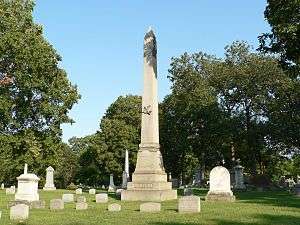Andrew G. Miller

Andrew Galbraith Miller (September 18, 1801 – September 30, 1874) was an associate justice of the territorial Wisconsin Supreme Court and later a United States federal judge.
Born in Carlisle, Pennsylvania, Miller attended Dickinson College and received a B.A. from Washington College, Pennsylvania in 1819. He read law to enter the bar in 1822, and was in private practice in Gettysburg, Pennsylvania from 1822 to 1838, during which time he served for three years as the Deputy Attorney General for Adams County. He served as an Associate Justice of the Supreme Court of Wisconsin Territory from 1838 to 1848.
When Wisconsin became a state in 1848, the United States Congress, by 9 Stat. 233, created a new seat for a federal judge of the United States District Court for the District of Wisconsin. Miller was nominated to that seat by President James K. Polk on June 12, 1848. That same day, he was confirmed by the United States Senate, and received his commission. Miller upheld the Fugitive Slave Act of 1850 in a case against newspaper editor and abolitionist Sherman Booth, regarding fugitive slave Joshua Glover.
On June 30, 1870, the District of Wisconsin was subdivided into Eastern and Western Districts. Miller was reassigned by operation of law to the United States District Court for the Eastern District of Wisconsin. He served until his retirement, on January 1, 1873. He died the following year in Milwaukee, Wisconsin, and was buried at Forest Home Cemetery in Milwaukee.[1]
Notes
- Andrew G. Miller at the Biographical Directory of Federal Judges, a public domain publication of the Federal Judicial Center.
- ↑ Miller, Andrew Galbraith 1801 - 1874 Archived April 13, 2006, at the Wayback Machine.
| Legal offices | ||
|---|---|---|
| Preceded by new seat |
Judge of the United States District Court for the District of Wisconsin 1848–1870 |
Succeeded by seat abolished |
| Preceded by new seat |
Judge of the United States District Court for the Eastern District of Wisconsin 1870–1873 |
Succeeded by James Henry Howe |